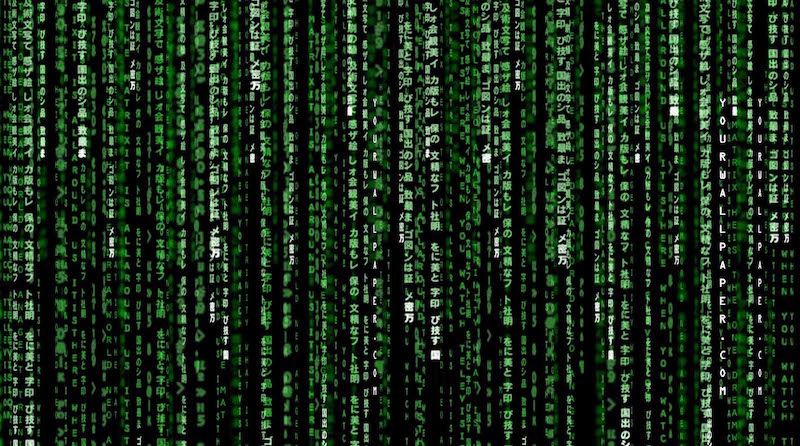In the 1999 classic the matrix, the Wachowski Brothers depicted an alternative reality in which all humans are connected to a central machine (the matrix) feeding them a form of hyper-realistic virtual reality, which only exists in their collective minds. By keeping them in this state, sentient machines are able to harvest the energy produced by each person to feed their own power needs.
The thought is disturbing. How would someone know whether what he sees is an illusion, instead of reality? The answer: it’s impossible. As Descartes famously said, the only thing one can be sure about is that one is indeed a thinking entity, everything else may very well be a trick. And this fact alone, in my opinion, makes the plot so compelling. Because as the movie reveals its secret, we are brought to reflect on our own condition, and we cannot help but conclude that we too, may be part of a matrix.
In fact, I believe most of us are already living in a version of the matrix today. Let me explain why.
The world has changed radically in the last decades. The invention and subsequent mass adoption of the internet has transformed almost every aspect of our lives in a profound way. It is the most significant revolution in the way humanity shares, seeks and generates knowledge since Gutenberg invented the printing press over half a millennia ago. The internet has become our main source of data. For most millennials it might seem odd to use other means to find information on a day to day basis. We use it to read the news. We use it to search for snippets of knowledge. In fact, almost all of the new information we acquire throughout the day comes from the internet (from our social networks, wikipedia, search engines and other places). Ironically, when we interact with each other in person, we usually share information we obtained online (did you see what Chris posted on Facebook? Did you hear the news about Italy?).
This is not, per se, a bad thing. Though this is a matter of opinion. It is simply the way of our modern world. Some may cling to the past, regretting better days where one could be blissfully ignorant of facts, without someone grabbing his hand-held computer and finding the relevant piece of information more quickly than it takes to change the subject. But there is no going back, and the internet will inevitably play an increasingly central role in our lives.
So far so good you might say, why all the fuss about the matrix? Well, your patience is about to pay off. The problem here is subtle. The problem is that there is no such thing as the internet (as in a single unified entity). We interact with the internet in very stereotyped manners: we either load up a search engine (most likely Google) and type in our query, or we navigate directly to our website of interest (most likely Facebook) and browse the content available there. However, in an effort to improve our experience in the online world, these companies are resorting to a very smart trick: they are tailoring the results and the content to better match our tastes and expectations. This is not new, and this is not secret. It is however, something many people are unaware of. The underlying motives are good: users are provided with a more enjoyable experience, and the search engines (or social networks and others) receive more traffic from happy users. It’s what one may call a win-win. Except it isn't.
How could this type of customisation be harmful? Let me give you a simple example. When I search for the keyword python, the first five pages do not mention anything about snakes or english comedians. Because Google has learnt that I am interested in programming, it helpfully brings up lots of pages about coding, hiding away what I am probably not looking for (Monthy Python or python snakes). On the other hand, when I do the same search anonymously, a menacing snake appears on the first page.
This becomes slightly disturbing when we consider the implications. If I had never heard of the British comedians Monthy Python, or about the snake, I might never chance upon them. I would remain unaware of their existence. This creates a sort of vicious cycle, where we are fed what we look at most, and automatically look at more of what we are fed. It becomes harder to chance upon new things, new ideas. By feeding us the content we are looking for, these services are also hiding away the content we aren’t looking for.
This was a rather harmless example, but one can easily see how it might be more pernicious when talking about politics, history or conspiracy theories.
Of course, humans have an innate tendency to do this on their own. People will often seek out others with similar opinions, or interacts with groups who share their ideals. Reinforcing this tendency by customising our access to the internet capitalises on this natural drive.
At the end of the day, these services contribute to the creation of what we may call a personality inertia, where people with a certain personality are encouraged to move forward in that direction, and where it becomes increasingly arduous for someone to diversify and expand.
Not all is dark however. Google for instance, is aware of this and tries to prevent it to some extent (by mixing in results they think you will like with some “untainted” results). But they might be the most benevolent in the bunch (do no evil, right?), what about news aggregators? What about Facebook, or Youtube? Can we truly believe all of these services are sacrificing some traffic for the sake of diversity?
Our digital world is a prison of sorts. Like the humans in the matrix, we are shown an illusion of the real world, a version of the real world designed to keep us happy, to reinforce us in our beliefs and sentiments.
This brings us to the following spooky conclusion: what you see when you look at your monitor, is not this beautiful, interconnected mesh of minds so many call the internet. Rather, what you see is a version of the internet tailored specifically for you, which in many ways is simply a reflection of your own personality.
In an interesting twist of events, if we dig deeper, we discovers that the way this customised internet is built and tailored for each one of us is through the use of machine learning algorithms. It turns out that what is keeping us in this virtual world, drawing one final and uncanny parallel to the movie, is precisely the same thing that was keeping the people from the movie trapped in the matrix: artificial intelligence. Luckily not the energy harvesting kind – for now.
If you enjoyed this story, consider subscribing to my website (you can use this link). That way, you'll automagically be notified every time a new story is online, right in your mailbox! I know, technology, right?



